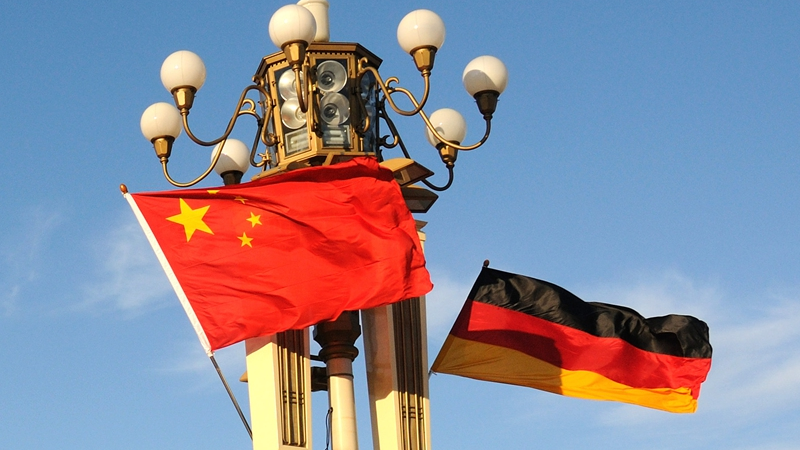
The national flags of China and Germany. [Photo/Xinhua]
By Keith Lamb
The German government unveiled its "comprehensive China strategy" on July 13, pointing out that there is "systemic competition" with China. The strategy says that China and Germany "urgently need to de-risk." This is in marked contrast to German Chancellor Olaf Scholz's visit to China in November last year when he said the two sides should enhance mutual understanding and trust and deepen practical cooperation in various fields.
While it's true that China has a different system to Germany's, competition is the wrong word to describe their relationship. The two countries, at opposite ends of Eurasia, pose no military threat to each other. When it comes to the conflict in Ukraine, which does draw in Germany, China has remained neutral.
Economically, Chinese-German relations are in synergy, not conflict. Statistics from the Statistisches Bundesamt (Germany's Federal Statistical Office) show that in 2022, China was Germany's main trading partner. Goods worth 298.9 billion euros ($335.3 billion) were traded between China and Germany compared to 248.3 billion euros ($278.54 billion) between the U.S. and Germany.
The German Chamber of Commerce has shown that 77 percent of surveyed German enterprises expect to expand their industries in China over the next five years. In the first 10 months of 2022, German foreign direct investment soared to 95.8 percent year-on-year. It's not just about lower production costs, German businesses also want access to Chinese consumers, hence Mercedes-Benz is expanding production for the China market.
Indeed, without China's systemic differences, its lucrative market and excellent production infrastructure would not exist. Why then is Germany captured by the absurd language of "systemic competition"? Every country must choose a system that suits its own needs relative to its own historical and civilizational circumstances for its own developmental good. This is a basic principle of sovereignty and international democracy.
Furthermore, it's ludicrous to assume that merely having a similar system is equal to "systemic cooperation." At least one must admit that it doesn't necessarily bring about joint benefits. The Ukraine conflict is one that has seriously degraded Germany's economy. Previously, Germany was doing well cooperating with Russia on energy consumption.
Ukraine has upended Germany's prosperity and this has been largely due to systemic cooperation within NATO, which has pushed eastwards due to systemic competition with Russia. Considering Europe became even more dependent on Russian energy after NATO's destruction of Libya, which also led to a rush of refugees overburdening Europe, further smashes the idea of systemic cooperation being in Germany's interest. The blurring of friend and foe is further muddied by Seymour Hersh's Nord Stream allegations. Under this international context, the claim of China being a competitor or a rival is rendered meaningless.

German Chancellor Olaf Scholz attends a question session of the Bundestag in Berlin, capital of Germany, Jan. 25, 2023. [Photo/Xinhua]
German Foreign Minister Annalena Baerbock said that "anyone who listens to China knows with what self-confidence it will decisively influence the development of our world – more repressive at home and more offensive abroad... China has changed and so our China policy must change too." Yes, China is having a greater global influence but this is for the better and its rise is peaceful.
Through the Belt and Road Initiative (BRI) and the Global Development Initiative (GDI), it seeks to develop the Global South and combat climate change. At home, China is solving poverty and building green infrastructure needed to combat climate change – hardly repressive. Global development aided by China will bring in more consumers for Germany's products.
The language Germany is using suspiciously mirrors that of the U.S. and considering the fact that Germany can't even bring itself to acknowledge the strange events of Nord Stream only point to a state that is under systemic control by a foreign power where Scholz's previous good-will trip to China is being reigned in.
Indeed, the independence of Germany, and by extension the EU, is often touted as a threat to U.S. hegemonism as independence would logically lead to integration with Eurasia, leading to a Europe that acts for its own good away from the interests of Transatlanticism. Hence, Europe is being hobbled from within – deprived of its greater Eurasian destiny.
Sitting on the tip of Eurasia, Germany, Western Europe, and the EU have incredible potential with cheap energy on their doorstep, which could fire up its industrial capacity. The largest upcoming markets are all in Eurasia and could all benefit from European expertise.
Increasingly, Europe and Asia are being interconnected through rail infrastructure, which bypasses the U.S.-controlled sea lanes. Shipping from Germany to China takes up to 40 days but this is reduced to 10 days by rail. For Germany, DuisPort is already the largest hub in Europe on the Western end of the Eurasian rail freight route, and with the rise of Asia, this land port can become even more prosperous.
However, without real independence, without seeing China as it really is, and without a realization of what Germany and Europe could become if they share China's attitude of systemic cooperation, Germany and Europe risk losing it all as their status remains a hegemonic pawn.
Keith Lamb, a special commentator on current affairs for CGTN, is a University of Oxford graduate with a Master of Science in Contemporary Chinese Studies. His primary research interests are China's international relations and "socialism with Chinese characteristics."

 中文
中文



